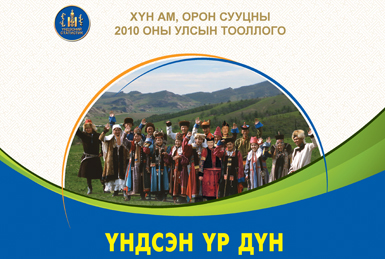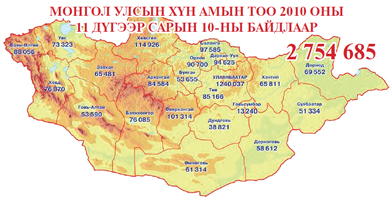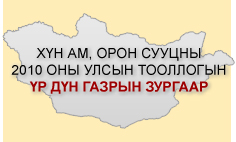


• Тооллого ямар ач холбогдолтой вэ?
• Тооллогод иргэд ямар үүрэгтэй оролцох вэ?
• Хамгийн сүүлд хэдэн онд тооллого болсон бэ?
• Тооллогын дүнг хэрхэн ашиглах вэ?
• Тооллогын асуулгын хуудсанд үнэн зөв хариулах нь ямар ач холбогдолтой вэ?

This year, 11 July is very special for Mongolians in many ways: First, it marks the start of the Naadam festivities, and the United Nations Population Fund, UNFPA, takes this opportunity to wish all Mongolians a Very Happy Naadam!

Second, we celebrate the World Population Day in a year that Mongolia has been elected as a member of the United Nations Statistical Commission. Thirdly, the world will reach seven billion people on 31st October 2011. Argentina Matavel UNFPA Representative in Mongolia
What does reaching 7 billion people mean? Should governments be alarmed or rejoice? Well, it depends on what angle to take and where you sit. The number by itself does not mean anything and it cannot be viewed out of context. There is need to do a "Decomposition Exercise", in order for population policies to respond according to 21st century and country specific realities.
While some countries in Asia such as Nepal, Laos, India, may be grappling with high fertility rates, in Mongolia, the Government wants to increase fertility and increase its population. What advice can UNFPA give to these countries to reach their desired goals? The answer is simple: Family Planning.
Many people think that Family Planning is only to reduce population. Not so. With Family Planning, women and families decide on the number of children and when to have them. Family Planning is also about good spacing between babies. When a woman has at least two years between pregnancies and has good nutrition, she produces healthier babies, the baby survival chance is higher, and the baby learning abilities are higher which in turn will translate in a healthier and smarter population for Mongolia.
The 2010 Census results show a great majority of the people of Mongolia are in active, reproductive age cohort of 15 to 49 years. That is just one ingredient to achieving the goal of increased population. There is need to invest in young people, including in their sexuality education. Putting young people at the center of public policies will produce multiplier effects for generations to come. Giving young women the knowledge and ability to control when and how many children to have allows them to stay longer in school. They become more educated and productive and can contribute to the national economy. Mongolia needs a much more educated population if it is to fully control and benefit from its vast mineral resources.
The Government of Mongolia wants its Population to grow. Current projections indicate that Mongolia will reach 3 million people in 2016. The choice is before the Government to decide whether these additional people will be productive, and if they will add value or be a burden to society and the economy. Family Planning is the magic key to healthier mothers and babies to a more productive population.

 HOME PAGE
HOME PAGE
















